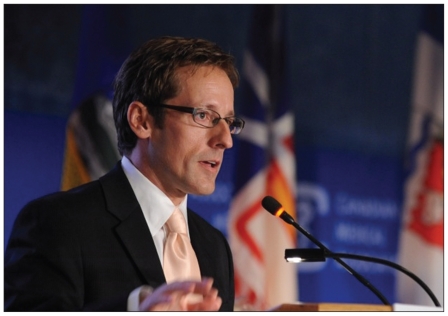The message was direct: many a doctor is out of sync with patients and as a consequence often does them a disservice or makes preventable medical mistakes.
The paradigm for the doctor–patient medical relationship must be revised to account for the explosion of medical information, as well as the increasing demands for transparency and accountability about therapies and outcomes, says Carbondale, Colorado, family physician Dr. John Findley.
Moreover, the increasing complexity of modern medicine has exceeded the ability of an individual doctor to deliver care safely, so doctors must become less paternalistic in assuming that only they have the answers and more willing to work collaboratively with one another and with other health professionals, Findley told delegates to the Canadian Medical Association’s 143rd annual meeting on Sunday in Niagara Falls, Ontario.
There are now more than 6000 known diagnoses and more than 4000 drugs, while medicine is becoming increasingly “mechanized” in the sense that both diagnosis and treatment are being driven by advanced medical technologies, he said.
When combined with the fact that most doctors are trained and “hardwired” as scientists to view health care in strict analytic and mechanistic terms, those factors have combined to create a situation in which medical errors are proliferating, “defensive medicine” has become the norm, patient dissatisfaction with physicians is soaring, the number of malpractice claims is rising and health care systems are becoming less “structurally sound,” he added.
In turn, physicians find themselves under greater stress. Some “60% of practising physicians report symptoms of burnout, defined as emotional exhaustion, depersonalization and low sense of accomplishment,” he said. Meanwhile, “studies show that students, residents and practising physicians grow more cynical and less compassionate during medical training and practice.”
“Defensive medicine” has become the norm, patient dissatisfaction with physicians is soaring, the number of malpractice claims is rising and health care systems are becoming less “structurally sound,” says Dr. John Findley, a family physician from Carbondale, Colorado.
Findley marshaled a raft of statistics which indicated that medical miscues are becoming more frequent, including ones indicating that 23% of patients had a postdischarge adverse event, that nearly 20% of one million heart failure patients admitted to United States hospitals were readmitted within a month, and that 41% of inpatients are discharged with test results pending.
Findley argued part of the solution to those many woes lies in a restructuring of doctor–patient relationship to make it “patient-centred” or essentially, more empathetic to the suffering of patients.
He offered as a preferred alternative to the current doctor–patient relationship, the concept of patient-centred care advocated by the Planetree Alliance, which features 10 components: “human interactions; family, friends and social support; access to information to empower patients, healing environments through architectural design; food and nutrition services; arts and entertainment (nutrition for the soul); spirituality (the importance of inner resources); human touch; integrated therapies (expanded choices); and health communities expanding the boundaries of health care.”
“We must somehow engage physicians in a dialogue that process improvement changes the experience, delivery, safety and quality of care,” he said. “Physicians must be oriented to and reminded of the current quality measures and standards of care that patient-centred care supports in order to improve the bedside experience.”
Findley toils for a Planetree hospital in Colorado. The nonprofit organization of hospitals and health care institutions was established in 1978 by Angelica Thieriot after an unpleasant, impersonal experience in hospital while battling a viral infection.
Findley later said in an interview that there is an unequivocal link between the incidence of medical errors and the nature of doctor–patient relationship.
Much of it has to be with trust. “How you present to the patient impacts your ability to listen to their story,” he says. “The filter that I have as a physician in the room is going to change the diagnostic pathway that I go down. If I’m open to you, if I’m listening to you, that will change. In other words, if I’m not distracted, if I’m not thinking about something else, if I’m not flipping through the chart, if I’m not thinking about my last six patients, I may do a much better job of hearing you and your story, that could tell me the one thing that I need to know to go down the correct pathway.”
In the traditional doctor–patient relationship, trust was both assumed and implicit, Findley says, adding that the incidence of medical errors and the increased demand for accountability puts physicians in the position where they must now earn trust.



